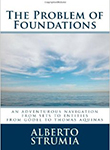The Problem of Foundations: An Adventurous Navigation from Sets to Entities. From Gödel to Thomas Aquinas

Alberto STRUMIA
CreateSpace Independent Publishing Platform
2012
202
1470023318
Analogy was foreseen by Gödel when he introduced the distinction between “proper” and “improper” classes, and by Russell with his theory of “types” and the notion of “systematic ambiguity”. In fact, the latter notions and theories allow everyone to distinguish among several different ways of existence of entities. In particular, thanks to analogy, one is able to distinguish between a “real” existence and an “intentional” existence, the former underlying the latter. What is in our mind and cognition exists according to a different way of being with respect to what is outside, in the external (extra-mental) real world.
Certainly the search for foundations is not a mere aesthetic question, purely philosophical, or a puzzle to waste time. Nowadays what happens in our contemporary world shows with evidence that we need objective foundations, acceptable by everybody, to establish the rights and duties of a human person, the rules of a civil society and the relationship between nations. If everything is arbitrary and questionable both human and social life become, finally, not livable, and even democracy ends up being ultimately impossible. In today’s world a tight link between objective truth and human life livableness, metaphysics/anthropology and ethics, ethics and right, can be especially experienced even before theoretically conceived.


